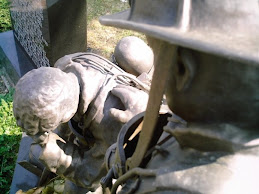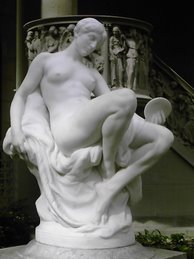
Pearson Education, which I’m told is one of the largest textbook publishers in the United States, bought this letter that I wrote five years ago, “An Open Letter to Dan Marino,” and plans to publish it in an upcoming textbook for high school freshmen. As I understand it, the letter will be included in a chapter with the theme “choices writers make.”
~ Joseph Kellard
Dan Marino, who retired as the most productive quarterback in National Football League history, was inducted into the Pro Football Hall of Fame in Canton, Ohio, in 2005. I wrote the following letter to the football legend prior to the August 2 induction ceremony.
“[T]the sight of an achievement [is] the greatest gift a human being could offer to others.” ~ Ayn Rand, Atlas Shrugged
Dear Dan Marino,
Congratulations on your induction into the Pro Football Hall of Fame. I thought this momentous occasion was the best time to tell you that you are among a select few people who have had a particularly positive influence on me. These few include my mother, who sparked in me a love for knowledge, Leonardo da Vinci, the Renaissance man devoted to an impassioned pursuit to know the world, and novelist Ayn Rand, a philosopher who discovered the knowledge necessary to achieve success and happiness in life.
Unlike most professions, professional sports put a spotlight on their participants for everyone to see, and athletics (particularly football, my favorite sport) illustrate, in a condensed, intensely exciting fashion, the virtues and values necessary for success in any field. Further, sport is one of the few fields left in our society in which achievement, excellence and even perfection are widely pursued and celebrated. Sports fans can routinely observe all of these qualities displayed in concrete action and be inspired to apply them to their own lives and work.
So I dismiss the detractors who deride sport as “just a game,” and who say “it contributes nothing to society.” Instead, I liken the careers of some athletes to works of art, such as novels or movies that project what men should and can be. At a certain level, an elite athlete stands as a real-life fictional hero, like a Roy Hobbes in The Natural. This is what your Hall of Fame career means to me. By faithfully following your play with the Miami Dolphins (my favorite team), I was offered the sight of a man who projected, game in and game out for 17 years, a host of exemplary virtues and values.
Your top value was to win every game and, ultimately, a championship. That this singleness of purpose was never subordinated to any other goal was made clear by your disappointed demeanor after you had tied or broken NFL career quarterback records in games the Dolphins nevertheless lost. Your brash confidence was an outgrowth of your ability to throw a football with unprecedented laser speed and pinpoint accuracy. This competence fueled your unshakable belief that at any point in a game you could put your team on your shoulders and singlehandedly command a victory. Some of the most memorable games in which these qualities shinned were your defeat of the undefeated Bears in 1985, your five touchdown passes against the Patriots on your return from a season-ending Achilles injury in 1994, and the come-from-behind victory on your fake-spike play against the Jets later that year.
And it was the hope that you gave to your fans — the hope that even with mere seconds left on the clock you could still stage a comeback (something you did in a near record number of games) — that was the most inspirational part of your career. Even in games the Dolphins were almost certain to lose, you still continued to play your heart out. You knew no other way to play. And you would undoubtedly have won many such games if your teammates had suddenly exhibited just half of your exemplary confidence, competence and will to win.
That is why it is myopic and unjust that some people highlight that you never won a Super Bowl. In actually, it was primarily the Dolphins teams around you that never won. When the greatest pure passer, the most productive quarterback, and one of the fiercest competitors in NFL history is the leader of a team, the fault for never having won a championship must lie elsewhere.
Add to all the above your study of the game, particularly of the opposing defenses that you famously picked apart, and the thought with which you approached your craft. Your intelligence — along with your considerable mental and physical toughness that allowed you to play in an outstanding 145 consecutive games for 17 seasons — are the keys to why you are the quarterback with the second most victories ever.
Considering all that you had to endure around you, it’s no wonder you became a fiery leader. Your leadership was captured best by that trademark piercing stare you darted at your teammates who failed to give their all as you always did. That stare said everything about your approach to football: take your work intensely seriously and expect the same in others.
And I learned form an interview with your son, Dan Jr., on Inside the NFL, that your leadership on the field carried over into your everyday life. He stressed that instead of telling him what the right things to do are, you mainly taught by example. And Dan Jr., an aspiring actor, also said something that reveals that you taught him a crucial lesson. “I don’t play a lot of sports,” he said. “But my father doesn’t really care about that. What he cares about is that you work really hard at what you love to do. And I really learned that from him.”
This reminds me of a scene from Ayn Rand’s novel The Fountainhead, when Howard Roark, a heroic, innovative architect, sits on a boulder overlooking a valley dotted with summer resort homes that he created. A boy on a bike comes across this view and is awed by Roark’s achievement. The scene ends with this inspiring passage: “Roark looked after [the young man who headed down a path toward the houses below]. He had never seen that boy before and he would never see him again. He did not know that he had given someone the courage to face a lifetime.”
I’m writing this letter because I want you to know that by offering me the sight of an outstanding athlete over his long career, you have played an important part in giving me the inspiration to pursue a lifetime of values. A poor student in school who in early adulthood had one foot on a road to self-destruction, I was able to turn my life around to the point where I have both feet firmly planted on a path to self-fulfillment. Today, I’m pursuing my passion, a writing career, with the seriousness, singleness of purpose and love of work that, in part, your career illustrated is desirable and possible and can bring success and happiness to a person’s life.
In closing, Dan Marino, I simply want to say to you what the boy on the bike told Roark before he headed toward his valley of homes: “Thank you.”
Joseph Kellard
* This letter was edited moderately from its original version.
Joseph Kellard is a journalist and freelance writer. To read more of Mr. Kellard’s work, visit his commentary blog The American Individualist at theamericanindividualist.blogspot.com, and his journalism blog at josephkellard.blogspot.com.































+-+June+2009.jpg)











No comments:
Post a Comment